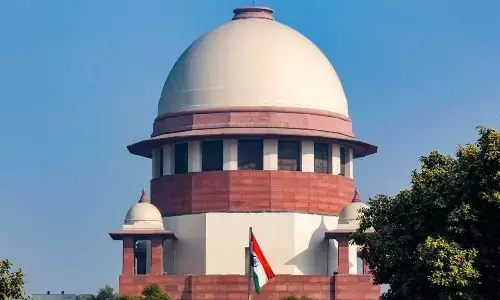Lotus blossoms; shrinks

BJP now governs mere 35% of the country's landmass in comparison to over 71% during its peak in 2017
The alacrity with which the Narendra Modi government moved legislations to bring about two major changes — altering Article 370 of the Constitution, its related bifurcation of the erstwhile state of Jammu and Kashmir and the Citizenship Amendment Bill Citizenship Amendment Act (CAA) — underscored the determination of Modi 2.0 regime to implement the Bharatiya Janata Party's decades-old promises.
In General Elections, Modi's BJP scored a victory bigger than in 2014, clinching 303 Lok Sabha seats, besting last time's 282, to emerge as the single largest party.
The party has kept its core states - the Hindi heartland (UP, Bihar, MP, Rajasthan), Gujarat and Maharashtra while posting fresh victories in West Bengal, Odisha and the Northeast.
The Triple Talaq Bill or the Muslim Women (Protection of Rights on Marriage) Bill, 2019 received President Ram Nath Kovind's assent on July 31, 2019.
The Triple Talaq bill was passed by the Rajya Sabha on July 30 through ballot voting with 99 votes in favour and 84 against. The bill's passing marked a landmark victory for Modi Government 2.0.
Protesting against the Modi government's controversial CAA and National Population Register, 19 peple lost their lives in UP and five in Assam.
The Assam's ruling BJP had a tough time rallying its North East Democratic Alliance (NEDA) partners behind it amid criticism of the updation of the National Register of Citizens (NRC), which the opposition claimed was a "botched-up" exercise.
More than 19 lakh people, a sizeable number of them Hindus, were excluded from the final NRC list that was published on August 31.
The Supreme Court-monitored process saw tens of thousands of applicants standing in seemingly unending queues outside seva kendras (assistance booths) with documents to prove their identity.
Countless families claimed some members made it to the register, aimed at weeding out illegal immigrants, while others could not.
Many of those deemed 'foreigner' and 'doubtful voter' were sent to detention centres, triggering condemnation. NRC coordinator Prateek Hajela was subsequently transferred out of the state amid allegations of "huge irregularities and anomalies" in conduct of the exercise, which entailed an expenditure of Rs 1,200 crore.
Setback for Modi
With Marashtra and Jharkhand joining the growing list of States slipping out of BJP's rule, the party now governs mere 35 per cent of the country's landmass in comparison to over 71 per cent during its peak in 2017 when it was in power in the entire Hindi-speaking heartland.
The Maharashtra Assembly elections have not gone down well with the BJP.
Its government collapsed as quickly as it was formed, after rebel Nationallist Congress Party's (NCP) Ajit Pawar first resigned as the Deputy Chief Minister and Chief Minister Devendra Fadnavis resigned soon after, citing no majority.
Its string of losses in States despite the massive victory in the April-May Lok Sabha elections may force the party's top brass to revisit its strategy for the assembly polls as it prepares for the upcoming battles in Delhi and Bihar.
The percentage of population being governed by the BJP in the states, either on its own or with its allies, now stands at around 43 per cent from over 69 per cent two years back, data analysis show.
Cyclone Fani
In May 2019, cyclone Fani hit as many as 1.48 crore people in Odisha. Almost 5.8 lakh houses were damaged. In Kerala floods over 1,000 people were marooned in Meppadi in Kerala's Wayanad district.
The floods have devastated the settlement in Meppadi's Puthumala village, which mostly comprises tea estate workers. Thereafter, nearly 10,000 people were sent to various relief camps in Wayanad alone.
In August, the rain fury had claimed the lives of nine people while nearly 43,000 people were evacuated from the flood-hit and rain-affected areas of Karnataka, stated authorities.
The worst-hit district in the state was Belagavi, where six persons had lost their lives, while 40,180 people were evacuated.
In July 2019, Bihar witnessed a grim flood situation with affecting over 88.4 lakh people from 13 districts. By the end of the month, the death toll increased to around 130, stated a report.
Rains wrecked havoc in parts of western Maharashtra where over 80 people lost their lives and lakhs got displaced after unprecedented rains.















